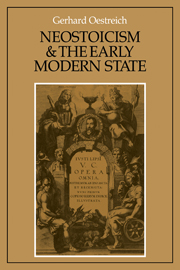Book contents
- Frontmatter
- Contents
- Foreword
- Introduction
- PART I JUSTUS LIPSIUS AND THE NETHERLANDS MOVEMENT
- PART II THE CONSTITUTIONAL DEVELOPMENT OF THE EARLY MODERN STATE
- 8 The religious covenant and the social contract
- 9 ‘Police’ and Prudentia civilis in the seventeenth century
- 10 From contractual monarchy to constitutionalism
- 11 The estates of Germany and the formation of the state
- 12 The constitutional situation of monarchy in Germany from the sixteenth to the eighteenth century
- 13 Army organization in the German territories from 1500 to 1800
- 14 The constitution of the Holy Roman Empire and the European state system 1648–1789
- 15 The structure of the absolute state
- Index
13 - Army organization in the German territories from 1500 to 1800
Published online by Cambridge University Press: 04 May 2010
- Frontmatter
- Contents
- Foreword
- Introduction
- PART I JUSTUS LIPSIUS AND THE NETHERLANDS MOVEMENT
- PART II THE CONSTITUTIONAL DEVELOPMENT OF THE EARLY MODERN STATE
- 8 The religious covenant and the social contract
- 9 ‘Police’ and Prudentia civilis in the seventeenth century
- 10 From contractual monarchy to constitutionalism
- 11 The estates of Germany and the formation of the state
- 12 The constitutional situation of monarchy in Germany from the sixteenth to the eighteenth century
- 13 Army organization in the German territories from 1500 to 1800
- 14 The constitution of the Holy Roman Empire and the European state system 1648–1789
- 15 The structure of the absolute state
- Index
Summary
No one in Germany has so far written a comprehensive study of the relation between political and military organization from the standpoint of constitutional history. Attention was drawn to the close connections between army organization and the life of nations by the soldiers Friedrich von der Decken and Max Jähns. Then, some sixty years ago, the constitutional historian Otto Hintze produced his classic outline of the subject, setting it in the context of world history. Before the second world war his pupil Fritz Hartung posed the question anew and provided an answer based on the overwhelming political and military experiences of the preceding generation. The present study owes much to these models, though its scope is altogether more modest. It seeks only to give a comparative account of what was taking place in the German territories in modern times up to the French Revolution. Hence no regard will be paid to the military organization of the Holy Roman Empire, the imperial circles, the imperial cities, or the imperial knights.
As the territories moved towards statehood, an important role was played in the process not only by the courts of law and the political and ecclesiastical administration, but also by the organization of defence. The role of defence has been somewhat neglected in comparative surveys. The fact is that in the sixteenth century the princes of Germany were not preoccupied solely with justice and religion. They were greatly concerned too, even if to a lesser extent, with providing peace and protection for their lands and subjects.
- Type
- Chapter
- Information
- Neostoicism and the Early Modern State , pp. 221 - 240Publisher: Cambridge University PressPrint publication year: 1982



